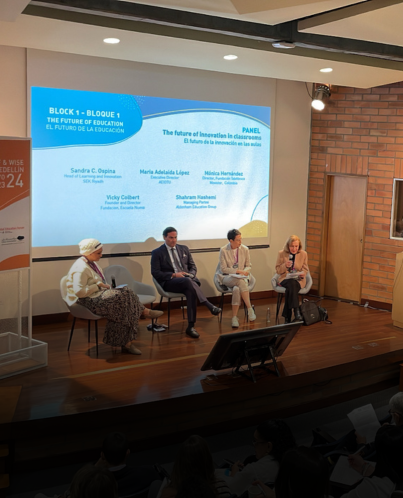Why We’re Preparing Students For Life After School
Education is meant to prepare students for their future lives. However, some traditional education systems can fall short in this regard, with schools choosing to focus primarily on academic skills rather than the more practical skills and knowledge that can help set students up for success in life after graduation. Today’s schools must make a concerted effort to prepare their students for success and teach them valuable life skills.
Why are life skills so important?
While academic achievement and success in exams are important, they’re not the be-all and end-all. Schools shouldn’t be placing so much emphasis on developing academics and the acquisition of knowledge, as these don’t always translate well in later life. Some of the world’s most successful CEOs agree – according to Ginni Rometty, IBM’s first female CEO, “Getting a job at today’s IBM does not always require a college degree. What matters most is relevant skills.” Many of today’s students can leave school with a deep understanding of their subjects but end up struggling to apply this knowledge to real-world situations.
Experts at the World Economic Forum have said that education is an inclusive and lifelong experience, and three critical skills – problem-solving, collaboration and adaptability – could help students to be better prepared for their future. Schools need to provide students with the tools and life skills they’ll need to succeed, instead of merely memorising facts and statistics.
The most important skills
The World Health Organisation has defined life skills as, “A group of psychosocial competencies and interpersonal skills that help people make informed decisions, solve problems, think critically and creatively, communicate effectively, build healthy relationships, empathise with others, and cope with and manage their lives in a healthy and responsible manner.” Problem-solving, collaboration and adaptability can all help students beyond the classroom. Practical life skills like financial literacy, time management, and problem-solving are all often overlooked in traditional education systems, but are essential for success in the real world. By teaching students these skills, schools can help to ensure that they are better equipped to handle the challenges and opportunities that come their way. These skills also encourage students to be more engaged with their learning. If they’re made aware that these tools will help them throughout their lives, then students will likely feel more motivated to pay attention, and try harder to hone these life skills.
Some life skills are especially valuable, as they can improve students’ mental wellbeing. Mental health issues in children are on the rise. An NHS report last year revealed that the number of children aged 7-16 with a probable mental health disorder had risen from 12.1% to 18% between 2017 and 2022 – while for children aged 17-19, the number had risen from 10.1% to 25.7%. Teaching students about mental health can help them to understand who they are and what their place in the world is – and encourage them to be more confident. Now, more than ever, students also need to be learning about self-esteem and the dangers of social media – as well as how to handle stress, which is possibly one of the most important life skills.
Preparing students for their future
As well as encouraging students to discover themselves and look after their own mental health, it’s also important to develop their sense of purpose and direction and teach them more practical skills. Schools should strive to offer their students guidance and support – by helping them to identify their strengths and passions, teachers can help students develop a plan to achieve their goals. This way, there’s less chance of students being left feeling directionless – and they’ll be better prepared for the challenges that will come their way after graduating. Life skills such as teamwork, leadership, and critical thinking are all highly valued by employers. By equipping students with these tools, schools can help them become more employable, setting them up for life after university, and preparing them for the job market.
These days, with technology an integral part of our everyday life, it’s increasingly important that students are able to master digital skills – from how to search on the internet to the basics of cybersecurity. At Aldenham Education Group, we use an array of digital resources like tablets and interactive e-books to improve our students’ digital literacy. Equipping students with these and more advanced abilities like coding and graphic design can help students to stand out from the crowd. Saudi Arabia, where we opened Aldenham Prep Riyadh last year, currently ranks first in both technical and vocational education, giving students the tools they need to improve their employment prospects. At AEG, we’re working to impart life skills like these to every one of our students – at all of our schools and ensure they can land top jobs.
What we’re doing
Earlier this year, Amazon announced that it would be opening up a new academy to support the digital economy and train people in how to succeed in the digital world. This is just one of the many educational opportunities available in the region for our students, and is one reason why we chose to open our first international school in Riyadh. With the facilities available at Aldenham Prep Riyadh – and all of our schools – we’re teaching our students lifelong skills. Through extracurricular activities like sports clubs and drama, they can learn how to be part of a team, how to lead a team, and explore their creative side at the same time. Our first school opened its doors in 1597, and is one of the oldest schools in the world. Despite the centuries of history and tradition, however, we’re not stuck in the past, and have in fact always looked to the future at AEG. Whether we’re training our staff in the latest teaching methods or embracing modern technology wherever possible, we’re preparing our students for life after school, and giving them the life skills they need to cope with a world that doesn’t yet exist.
Schools need to make a concerted effort to set their students up for success in the future, by focusing on practical and interpersonal skills. Giving students the tools they need to succeed in the wider world can create a fulfilled generation of young people who are equipped to make a positive impact on the world, and we’re proud to play a part in this at AEG. We ensure our students can handle all the challenges and opportunities that come their way – find out more about the skills and values we aim to impart.


